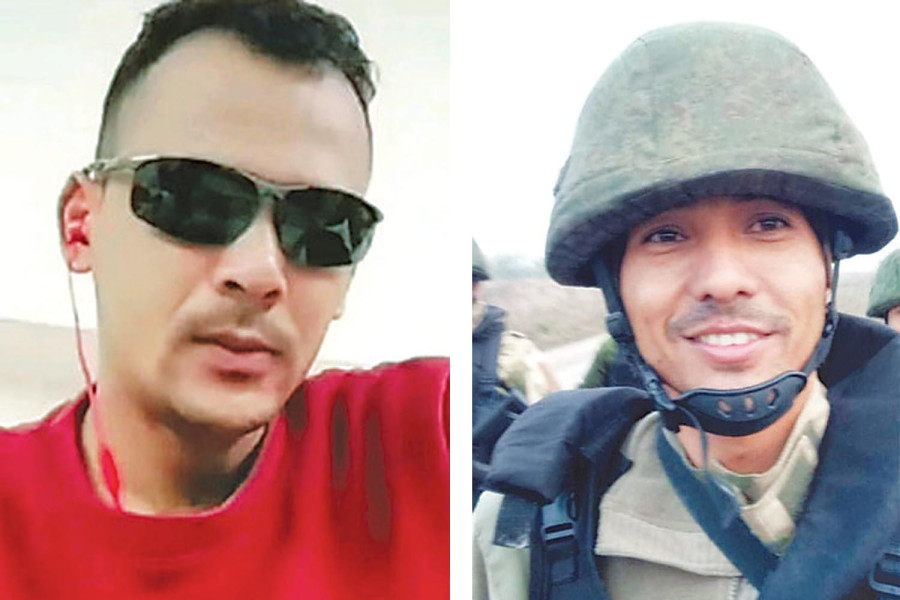National
Russia ignores calls to stop hiring Nepalis to fight against Ukraine
Foreign ministry officials say Nepal failed to take up the matter of Nepalis’ recruitment with Russia on time.
Anil Giri
On Saturday, Nepali Congress general secretary Bishwa Prakash Sharma urged Prime Minister Pushpa Kamal Dahal to talk directly to Russian President Vladimir Putin to stop the recruitment of Nepali youths in the Russian army.
Sharma’s calls come at a time when as many as seven Nepali nationals have so far been confirmed killed while fighting Ukrainians on Russia’s behalf, while hundreds of Nepalis have joined the Russian forces.
The Nepal government has dispatched two diplomatic notes to the Russian government, urging it to stop recruiting Nepali nationals and deploying them in its fight against its neighbour. But Moscow is yet to respond to those back-to-back diplomatic notes, according to a senior official at the Ministry of Foreign Affairs.
Besides sending the diplomatic notes, Foreign Minister NP Saud has also discussed the matter with Russian Ambassador to Nepal Alexei Novikov. But the Nepali side has yet to get an official response. In its diplomatic notes, the Nepal government has also urged Moscow to send back Nepali youths fighting for them.
Speaking at a party function, Sharma urged the prime minister to “immediately take the initiative” to bring back the Nepali youths who have illegally landed in Russia and joined its army. “It seems the government is not that keen on bringing back the Nepali youths who are being illegally deployed in the Russia-Ukraine war,” Sharma said.
The Nepali Embassy in Moscow has reported that around 200 Nepali nationals are currently serving in the Russian army and that seven of them have been confirmed killed. After the Nepal government started cracking down on the illegal nexus sending Nepalis to Russia on various pretexts, the number of Nepali landings in Russia has recently come down, said Milan Raj Tuladhar, the Nepali ambassador to Russia.
Tuladhar added that they also await a response from Russian authorities on Nepal’s request to stop recruiting Nepalis.
“The attention of the ministry has been drawn to the news on social networking sites that Nepali citizens have joined foreign armies,” the Ministry of Foreign Affairs said in a statement on August 1. “The policy of the Nepal government does not allow Nepali citizens to join foreign armies except for the fact that Nepali citizens are being recruited in the national armies of some friendly countries as per the agreements between Nepal and those countries.”
Meanwhile, on December 4, the foreign ministry reiterated its statement and asked Nepali nationals not to join a foreign army except those approved by the government.
According to a senior foreign ministry official, after videos of Nepali nationals serving in the Russian army started making rounds on social media, some senior officials including then-foreign secretary Bharat Raj Paudyal had urged Foreign Minister Saud to issue a public notice immediately. The notice would ask Nepali citizens not to join the Russian army and to resist unreasonable offers.
Some senior foreign ministry officials had communicated to Minister Saud that if Nepal allowed people to visit Russia and they eventually joined the army, it could cause a huge humanitarian crisis. The war won’t stop soon and it would be hard to repatriate those who get killed and injured in the battle.
Two foreign ministry officials directly involved in the matter told the Post that they were dismayed that the foreign minister and some other ministers concerned had ignored their request.
“We reported that networks of influential people were involved in trafficking Nepalis, who in turn ended up joining the Russian army. Nepal did not write a diplomatic note when this first came to our notice,” one of the two officials said on the condition of anonymity. “We knew that Nepalis were going to Russia even via various Gulf states. Only recently did we issue a public notice and send diplomatic notes to Russia.”
Minister Saud also summoned the Russian ambassador to the ministry and raised its concern. The foreign ministry has also asked Nepal’s ambassador in Moscow to take up the matter with the Russian authorities, but there is as yet little progress.
Ambassador Tuladhar said that as Russians are busy with Christmas and New Year celebrations, a response might be some time coming.
“The government’s duty is not just to count dead bodies,” said Sharma, the Congress general secretary. “Talk to the [Russian] ambassador. If that does not work, talk to Vladimir Putin. We should take action against those involved in sending Nepalis to join the Russian army. It is also the government’s job to bring them back home safely.”
The government doesn’t allow Nepali nationals to serve in foreign armies except for in India and the United Kingdom. But that hasn’t stopped Nepali youths from enrolling individually in the militaries of several other countries.
With the help of human traffickers, many Nepalis have reached Russia on student and tourist visas and joined its fighting force.
In May, Russia paved the way for its army to recruit foreign nationals, with a decree by President Putin. According to an internal report Nepal’s Embassy in Moscow sent to the ministry in Kathmandu, there has been a surge of the number of Nepalis in Russia. Many of them have reportedly joined the armed forces following the presidential decree.
“Even some Nepali nationals living in Russia are involved in the trafficking of fellow Nepalis,” the foreign ministry official said, “prompting the Nepali Embassy in Moscow to request the Russian government to discourage nonessential visits of Nepali nationals.”
Sharma, speaking at his party’s function, praised the government for bringing Nepalis from Israel home safely. “The country now has to do the same with those in Russia,” he said.
Minister Saud said that the government was doing its best to bring back its nationals from the Russian army. “Efforts are being made,” he said, referring to the talks going on with the Russians.




 10.12°C Kathmandu
10.12°C Kathmandu














